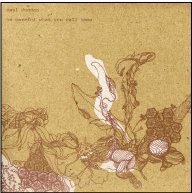Paul Duncan, Be Careful What You Call Home
reviewed by dave heaton

On the one hand, Paul Duncan's Be Careful What You Call Home offers comfort, like the well-worn record of your favorite folk singer from the 1970s. When he sings, his voice is subdued yet friendly, his lyrics emotional in an evocative, open-to-interpretation way. The songs, and album, are short enough to play over and over, to rest on like a pillow or your favorite pair of shoes.
At the same time, Be Careful What You Call Home is experimental, an exploratory album by a musician whose mind is on atmosphere, on feeling, on where sound can take you. Close to two-thirds of the album is instrumental. With guitar, piano, banjo, cello, electronic beats, and more, Duncan and friends expound on the same feeling as the more conventionally structured "songs", in a more abstract, playful way, nodding towards Brian Eno, towards Steve Reich, lightly towards free jazz.
It isn't fair to think of the album as split between "songs" and "experimentation", though, as it's all molded together under the same general feeling, the same vibe: that of fleeting, remarkable beauty. The title Be Careful What You Call Home suggests that impermanence, while the lyrics to the first song "In a Way" comment on how Duncan is capturing the aura of music past while creating something new: "In a way I've never before stolen / but in a way I have."
Duncan's lyrics are, on the whole, wonderfully brief, evoking and repeating, without explaining. There's a continual advocation of mystery, of not trying to capture everything in words, trying not to over-analyse. As he sings in "Content to Burn...", "Songs in the distant night / saying hello to us / if you don't say a word / it could be good like this." That feeling of going-with-the-flow and experiencing fits with the album's adventurous nature, how Duncan gently probes into sound and melody and texture and mood. It's quite amazing to have an album feels this free and open, but at the same time intimate and compact. There's that stereotype of the "headphones album", a deep, sonically layered work that you can fall back into, versus what you might consider a "car stereo album", the sort you'd want on a beat-up cassette that you can play again and again, that'll get you to your destination and back, that you can turn up loud and sing along to. Be Careful What You Call Home manages to somehow be both, to offer both newness and familiarity, to make you feel both lost and found.
Copyright (c) 2005 erasing clouds |
|